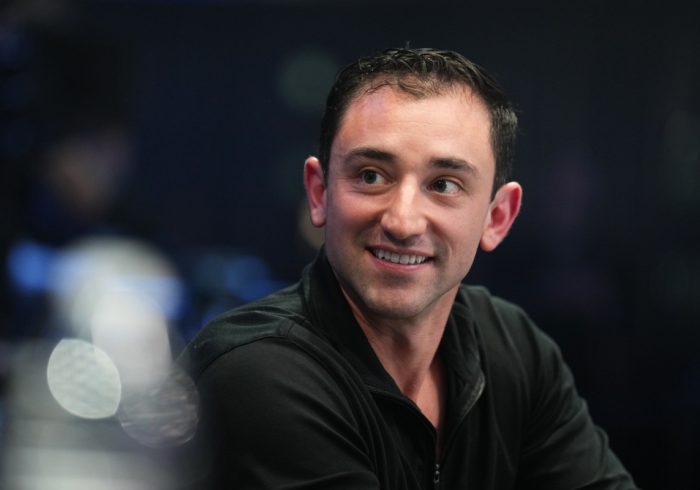PHILADELPHIA — No one put on a better show at Citizens Bank Park on Friday than Jean Segura.
The second baseman seemed to know that a good performance requires a bit of texture. He pulled out all the tricks of an experienced showman: Never let the audience get comfortable. Always keep them guessing. Be willing to raise the stakes—even if it’s risky—and understand that it’s a hell of a lot more fun to be interesting than it is to be consistent.
Those principles are familiar in the context of, say, a scripted drama. Here is what they look like in a baseball game: Segura made a baffling error on the most straightforward of plays, knocked in the winning run on a pitch that seemed entirely unhittable and, finally, got picked off to end the inning. In the span of 25 minutes. That was all from one inning. And if the rest of his night was somewhat less eventful, it was no less dramatic, with a handful of clutch defensive plays that helped seal a 4–2 Phillies victory over the Padres in Game 3 of the National League Championship Series.
“I like the pressure,” grinned Segura, who is finally playing in the postseason for the first time in a career that has lasted more than a decade. “I love it. Even when I make a mistake early in the game—it was a lot of things going through my mind. You know what? It’s another game. Maybe I get an opportunity later in the game to win the game or maybe to do something special… I’m going to go there and continue enjoying the ride. I waited 11 years for the opportunity. I’m not going to go back.”
It was the first time in postseason history that one player made an error, recorded an RBI and got picked off in the same inning.
And if Segura’s enjoying the (admittedly bumpy) ride—what about everyone he took on it with him?
“He’s got the clutch gene,” said Phillies left fielder Kyle Schwarber.
“Made up for the error for sure,” said manager Rob Thomson. “He’s an emotional guy, and he really wants to win.”
“That’s what you want to see from your double-play partner—someone that tries to teach you what to do,” said rookie shortstop Bryson Stott, describing how the veteran was able to reset mentally after his error.
Segura’s wild night took off in the fourth inning. The Phillies had a 1–0 lead, but the Padres were threatening, with runners on the corners and one out. San Diego second baseman Jake Cronenworth hit an easy grounder to short—what could have been an inning-ending double play. Stott fielded it cleanly, Segura covered the bag and… watched the ball come right out of his glove. It wasn’t that he lost it on the transfer. He never had it in the first place.
“That’s a play that I probably made 3,000 times in my life,” Segura said. “But for some reason, I missed it.”
The lead runner scored. The Phillies were able to get out of the inning without further damage, stranding the two runners, but the game was now tied.
Yet Segura would not have to wait long for his chance at redemption.
He came to the plate in the bottom of the inning with runners on second and third and two outs, and quickly fell behind in an 0–2 count—first watching a curve drop in for a strike and then fouling off a cutter. (Which, again, those principles of dramatic tension: This one is basic. Everyone knows a game-saving hit will feel better if the hitter starts down 0–2.) Segura next saw a ball in the dirt and fouled off a four-seamer to stay alive. And then came the fifth pitch of the at bat—not a pitch to hit. Very clearly not a pitch to hit. (Another core dramatic beat: Catch the audience off-balance.) This was a slider out of the zone, way out of the zone, less than a foot off the ground.
So he swung anyway. He dropped it into shallow right field.
Both runners scored; Philadelphia retook the lead, 3–1. It was a stadium-shaking moment of catharsis.
…which Segura ended by dancing off first and getting picked off easily.
The inning was over. Segura had, by himself, created the need for a hero, decided to play the role himself in dramatic fashion, and then wrote his own unsatisfying ending.
“We all trust each other,” Phillies starter Ranger Suárez said through an interpreter. “I know that Jean made the error, but you can look at his at bat later, you can look at plays that he made on the field later. Everyone on the team is like that. We all have plenty of confidence in one another.”
Segura flailed at a breaking ball well out of the zone and dunked it into right field for a two-run single.
Matt Rourke/AP
If there was any lingering bad taste from the pickoff, no matter; Segura followed it up with lockdown defense the rest of the night. That was capped with a diving catch to end the seventh inning that showed every bit of his dramatic range.
“I’m fired up. I don’t know how to explain that, but it’s like Goku,” he said, invoking the Dragon Ball Z character. “Like fire inside my body. Like I just want to get it out, like explosive, like ahhh. If you don’t get emotional with 45,000 people in the stands or 46,000 people in the stands, you’re playing the wrong sport.”
The biggest takeaway from Mr. Segura’s Wild Ride? It encapsulated the Phillies’ stretch run as a whole just about as well as anything possibly could. It was thrilling to watch, if not always pretty, and the tension never dipped. It was either a very fun way to be miserable or a very miserable way to have fun. Yet the most important part was simple: It worked. Segura added more than he took away. That is something the Phillies, against all odds, have been managing to do all season—a club that fired its manager in June, that had to put in significant work on its fundamentals all summer, that needed until the final days of an end-of-season road trip just to clinch a playoff spot.
That team is now two wins away from the World Series. It’s a situation that offers plenty to evaluate and analyze and break down. But most of all? It’s just good drama.
More MLB Coverage:



